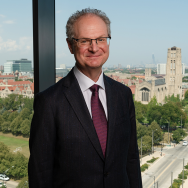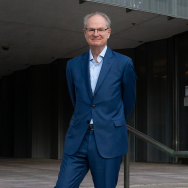When Edward H. Levi delivered his inaugural address as the eighth president of the University of Chicago, he began his speech at Rockefeller Memorial Chapel by reflecting on his own experience as a University alum.
“I trust I will be forgiven a personal word,” Levi said in November 1968. “I approach this unlikely moment with many memories.”
Levi, PhB’32, JD’35, was the first UChicago graduate to serve as president of the institution. By the time he assumed the presidency, he had already served as provost and Law School dean and was a renowned UChicago professor. In his address, he noted the sense of gravity and anxiety he felt at taking office.
“It is not that we fear mistakes,” Levi said. “Perhaps we should fear not to make them.”

On Oct. 29, the University of Chicago will celebrate the inauguration of Paul Alivisatos as its 14th president. A 1981 graduate of the College, Alivisatos is the second UChicago alum to hold the office. In keeping with tradition, the ceremony will consist of an academic procession, music, remarks from members of the University community, and an address from the new president.
Over the course of the University’s history, new presidents have used their inaugural addresses to celebrate the qualities that make the University unique, and to articulate a vision for its future, according to John W. Boyer, AB’69, PhD’75, dean of the College.
“Inaugural addresses inevitably involve a restatement of the University’s core values, which makes them ‘identity speeches,’” said Boyer, the author of The University of Chicago: A History. “This has been an immensely proud place, but not a vain place: It views itself as a place of distinction. So the expectation is that the new president will articulate the reasons for that distinction and assure that it will continue in the future.”
Below is a look at a few past presidential inaugurations, revealing some of the ways the UChicago tradition has evolved, and how some presidents have set the tone for their administrations at the University.
The construction of Rockefeller Memorial Chapel was completed in 1928, a year before the first presidential inauguration ceremony in the University’s history.
The first inauguration—four decades after the University’s founding
Though the University of Chicago was founded in 1890, the first inauguration was not held until 1929 because the University’s first four presidents all declined formal ceremonies.
For founding President William Rainey Harper, the ceremony was the opening of the University itself, which he wanted to imply a seamless continuity—“as if the University had existed for 1,000 years,” Boyer said.
Photo gallery 1/9
The inauguration of Robert Maynard Hutchins in 1929 introduced pomp and circumstance—so much that the University of Chicago Magazine described the ceremony in a 1993 article as “a sort of glamorous debutante’s ball for the institution.”
Driven, ambitious and self-assured, Hutchins had been chosen at 30 years old, having already served as the dean of Yale Law School. For his inauguration, more than 1,800 guests entered the newly completed Rockefeller Chapel, where Hutchins delivered—without notes—a sweeping speech that invoked the University’s history, commitment to faculty research and endowment as sources of strength.
He characterized the faculty as guardians of the University’s “spirit,” which he defined as: an emphasis on productive scholarship, investing in the best people, working with and for the city of Chicago, and an experimental attitude.
“These four characteristics will, I think, be the insignia of the University’s spirit to the end,” Hutchins said.
“... a sort of glamorous debutante’s ball for the institution.”
Though Hutchins’ speech was well-received, the timing proved incongruous: The stock market had crashed three weeks earlier, in late October, reducing the value of the University’s endowment and beginning the Great Depression.
Nevertheless, Hutchins became the longest-tenured leader in University history, serving as president from 1929–1945 and chancellor from 1945–1951.
‘A time of great difficulty’
Inaugurated on Nov. 14, 1968, Edward Levi took office amid the Vietnam War. Student protestors gathered at his ceremony and interrupted several speakers at his inaugural dinner at Chicago’s Hilton Hotel.

Levi acknowledged the tense atmosphere during his address. “We meet in a time of great difficulty,” he said. “The society is divided. The conditions of public discussion have changed.” He also acknowledged Vietnam, saying “The outrage of this war continues.”
The three past presidents who preceded Levi—Hutchins, Lawrence A. Kimpton and George W. Beadle—attended the ceremony, all of whom had struggled with the kind of momentous challenges that Levi would also confront.
Their presence, which Levi acknowledged early in his speech, symbolized “a kind of dramatic statement about the efficacious transfer of power,” Boyer said, and “institutional continuity and legitimacy.”
Levi served the University until 1975, when he departed to become U.S. attorney general under President Gerald Ford after the Watergate scandal.
“The society is divided. The conditions of public discussion have changed.”
A ringing celebration, and a quieter ‘first’
Hanna Holborn Gray was inaugurated in 1978, after the retirement of Levi’s successor, John T. Wilson. She came to lead the University, in part, because of an incident that occurred at Levi’s inauguration, when Asst. Prof. Marlene Dixon left Levi’s inaugural procession to stand in solidarity with students protesting the war.
When the administration later denied Dixon a reappointment, protests ensued, and Gray—then a professor of history—was chosen to lead the committee reviewing the decision. That role precipitated her rise in higher education administration: She was named a dean at Northwestern University in 1972, and provost at Yale University in 1974.

By the time she was elected president at UChicago, Gray was among the first women to lead a major research university, but that point was hardly acknowledged at the ceremony.
“People felt the best way to honor her, and her many achievements, was not to cast her in some special role,” Boyer said, “but to say that she was the latest occupant of an office held by many distinguished people.”
“Vivat Hanna” welcome banners and papier-mache gargoyles were hung from campus buildings, and students dressed as clowns passed through her inaugural procession handing out balloons, according to the University of Chicago Magazine.
In her address, Gray also acknowledged challenges facing the University—but made it clear that she would not be complacent about the University’s academic strength when addressing them, saying that the most dangerous way to deal with problems “would be to engage in an apparently principled descent to decent mediocrity.”
Reaffirming UChicago’s values
Robert J. Zimmer, the University’s current chancellor, served one of the longest tenures of any UChicago president. Zimmer was inaugurated 15 years ago, on Oct. 27, 2006, in a ceremony that nodded to the tradition established by Hutchins, with faculty and guests in full regalia processing into Rockefeller Chapel.

In a sense, as the UChicago Chronicle observed, Zimmer was returning “home” to the University, where he had been a professor of mathematics and a senior administrator for over a decade before departing in 2002 to serve as provost at Brown University.
In his address, Zimmer emphasized the continuity of UChicago’s values, which he said had remained intact and recognizable over the University’s entire history: “At any time since its inception, we would know unmistakably that we were at the University of Chicago,” he said.
He has sought to shape the University’s current trajectory, in his own words, by expanding on the vision of the institution’s founders and reaffirming those values, including free expression, emphasis on rigorous scholarship and research, and a willingness to innovate and take risks.
“My core responsibility as president of the University of Chicago is—and has to be—to ensure that the University realizes its enduring values and fundamental principles in the most powerful and lasting way possible,” Zimmer said during his address.


















